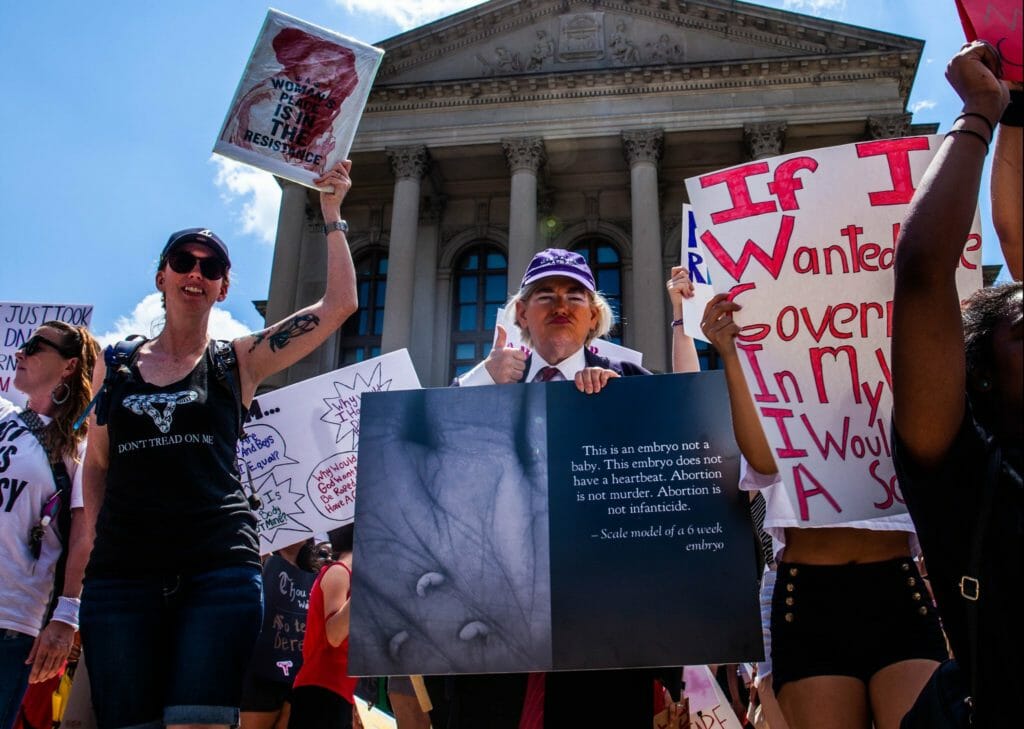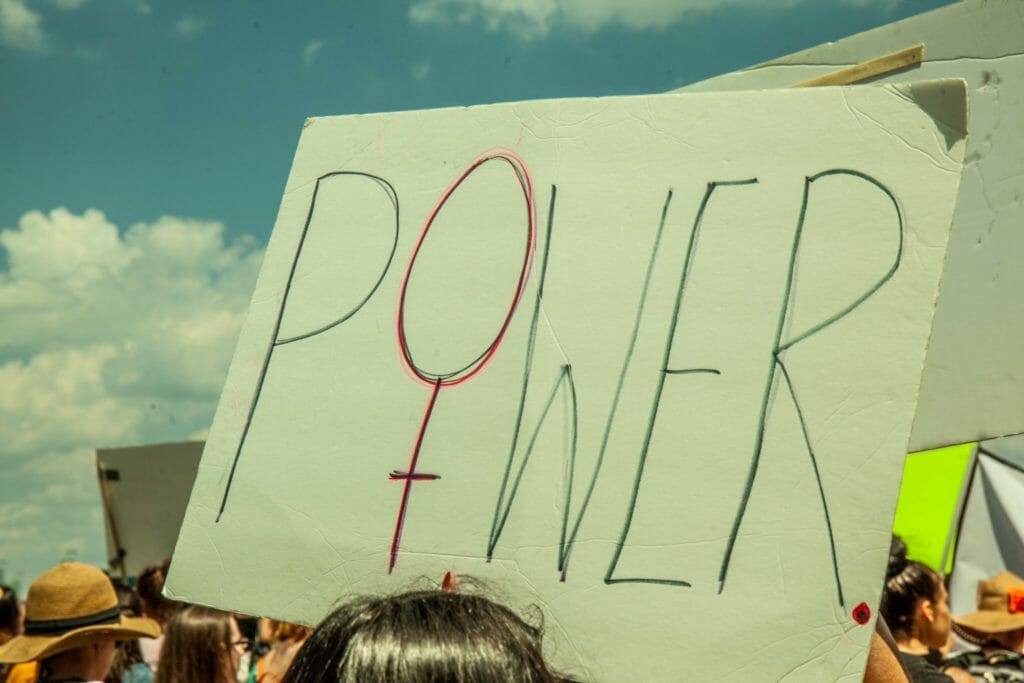It is indisputable that from 2010 to 2018, Brian Kemp used his executive powers as Georgia’s Secretary of State to manipulate Georgia elections by suppressing and intimidating voter registration efforts. One of his most common tactics was launching investigations into minority voter registration groups based on flimsy or non-existent evidence, stalling or discouraging voter mobilization efforts in the process. While none of these investigations resulted in any convictions or findings of wrongdoing, they severely affected Georgia’s election cycles and impeded registration for tens of thousands of voters, conveniently leading up to Georgia’s 2018 gubernatorial election. What follows is an overview of Kemp’s most egregious uses of legal investigations to intimidate voters of color and disrupt minority participation in elections.
2010: The Quitman 10+2
Kemp’s history of intimidating minority voters began shortly after he became Georgia’s Secretary of State in 2010, with a controversial investigation into a school board election in Quitman, Ga. Quitman is the county seat of Brooks County, a rural county that sits on the Florida-Georgia border with a population of 16,243. Demographically, Quitman is roughly 66% black, while Brooks County as a whole is 60% white. However, with many white families choosing to send their children to private schools, Brooks County’s public school system is mostly composed of black students.
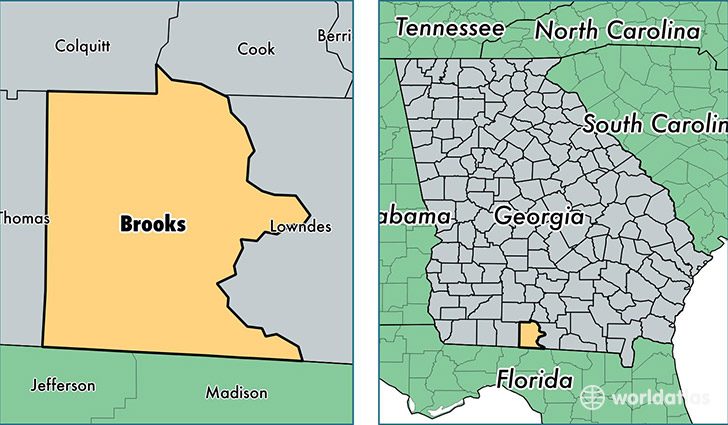
In the 2010 midterm elections, Brooks County elected a majority-black Board of Education for the first time in its history due to voter registration efforts mobilizing voters through absentee ballots. This prompted Kemp’s office to launch an investigation into organizers and residents of Quitman. The investigation led to the arrests of 10 black voting organizers, including an already-seated member of the Board of Education and two newly elected members. At Kemp’s urging, Gov. Nathan Deal issued an executive order that removed the newly elected board members and temporarily reinstated the white-majority school board. A year later, two more organizers were arrested and a full 120 felony counts were filed against the 12 individuals who became known as the Quitman 10+2.
The catalyst of the Quitman investigation was the large number of absentee ballots that had been mailed in—some of them from people who had never voted before. Kemp and other conservatives cited this as evidence of voter fraud. When describing the case for a news segment in 2012, Fox News anchor Eric Shawn claimed, “So many absentee ballots flooded in, it set off suspicions of possible hanky-panky.”
The Quitman 10+2, however, were shocked by the accusations and confused about what they had supposedly done wrong. “I called frequently to the Secretary of State’s elections division for information and to get clarification,” said organizer Nancy Dennard in a Yahoo News interview in August 2019. “I was always on top of what’s legal and what’s not.”
Dennard, a former educator who became the primary organizer of the Quitman 10+2, had long felt that the black community in Brooks County needed better representation in local government to improve the public school system. After running unsuccessfully for the school board in 2004 and 2008, Dennard realized that many elderly people in her community were registered voters who had trouble leaving their house to vote. She organized efforts to reach out to older people and provide them with the tools they needed to vote, including absentee ballots and assistance with the delivery of the ballots. These mobilization efforts helped Dennard earn a seat on the school board in 2009. Dennard then recruited teachers Diane Thomas and Linda Troutman to run for the school board in 2010 and began a similar outreach campaign.
Smart was then charged with 32 felony counts with the threat of a lifetime in prison for “unlawful possession of ballots” and “interfering with an elector”—all primarily for helping elderly voters mail in their absentee ballots.
Lula Smart, Thomas’ sister and a lifelong Quitman resident, was working as a waitress at her mother’s restaurant when Thomas ran for a seat on the Brooks County Board of Education. Under the direction of Dennard, Smart began reaching out to people in the community about the upcoming election to help organize voters, particularly elderly people who never knew they could vote through absentee ballots. Smart was then charged with 32 felony counts with the threat of a lifetime in prison for “unlawful possession of ballots” and “interfering with an elector”—all primarily for helping elderly voters mail in their absentee ballots.
After the case dragged on for years, a jury finally cleared Smart of all charges in September 2014. A few months later, all of the remaining charges against the Quitman 10+2 were dropped. Georgia Attorney General Sam Olens issued an official clarification on the case in 2016: “It is not a violation of the law for a person other than the elector to whom the absentee ballot was issued to take possession of and mail absentee ballots for that elector or electors.”
Despite the investigation, the Quitman 10+2 were persistent in their mobilization efforts, resulting in wins for the Democratic Party in Brooks County. Smart was elected to the Brooks County Board of Commissioners in 2015 and Dennard was elected as Quitman’s mayor in 2017.
2012: The Asian American Legal Advocacy Center (AALAC)
The next major investigation from Kemp’s office came just before Election Day in 2012. The AALAC had been assisting recently naturalized citizens to register to vote since 2010. But in October 2012, Executive Director Helen Ho discovered that some of these people were still not listed in the voter registry and were being turned away from the early voting polls.
Ho pressured the Secretary of State’s office for an explanation. When they didn’t respond, the AALAC issued an open letter on Oct. 31, 2015, demanding answers as to why voters who worked to make sure they were registered to vote were being turned away. The statement called for immediate action on the state’s behalf to ensure the new legal citizens could vote. Two days later—less than a week before Election Day—Kemp responded by launching an investigation into the AALAC, questioning the legitimacy of the organization’s registration methods. In their letter requesting a probe, Kemp’s office cited potential legal concerns surrounding AALAC\’s photocopying and public disclosure of voter registration applications, such as whether the group had received written permission from voters to make copies of their paperwork before filing the originals.
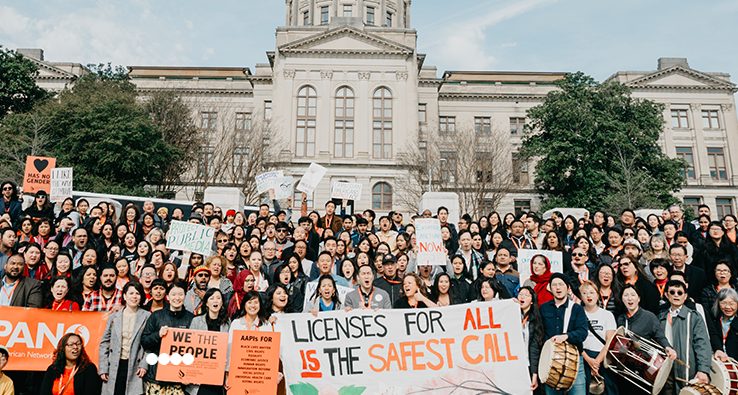
The investigation lasted two and a half years before Kemp’s office closed the case with no evidence of violations. Ho made it clear in an interview with the New Republic in 2015 that this was a politically and racially motivated attack by Kemp, stating that the AALAC was “retaliated against.”
Ho is now the executive director of Asian Americans Advocating Justice-Atlanta, Inc. (AAAJ), which has replaced AALAC and continues its efforts to register newly naturalized citizens and Asian American voters. The organization, along with the Georgia Coalition for the People’s Agenda, the NAACP, and others, filed a lawsuit against Kemp on Oct. 11, 2018, for the unconstitutional “exact match” protocol implemented in Georgia’s registration systems. U.S. District Judge Eleanor L. Ross ruled against Kemp in the case on Fri., Nov. 2, 2018, stating that Kemp’s restrictions raised “grave concerns for the Court about the differential treatment inflicted on a group of individuals who are predominantly minorities.”
Despite this, Georgia legislators drafted and passed House Bill 316, which still allows the use of exact match during voter registration and fails to address electronic voting machine security issues. HB 316 was signed by newly-elected Gov. Kemp in April 2019.
2014: The New Georgia Project
During a July 2014 speech in Gwinnett County, Kemp told fellow Republicans, “Democrats are working hard. All these stories about them, registering all these minority voters that are out there and others that are sitting on the sidelines … If they can do that, they can win these elections in November.”
The voter registration effort Kemp referred to then was the New Georgia Project (NGP), a group founded by his future opponent Stacey Abrams with the goal of registering 120,000 minority voters before the 2014 elections. As Georgia’s then-House of Representatives Minority Leader, Abrams discovered that Georgia had almost 900,000 unregistered minority voters and nearly 80% of them could be expected to vote Democrat. With this in mind, she started the New Georgia Project organization to help mobilize minority voters, which (if successful) could potentially flip the state blue. This bold initiative caught Kemp’s attention.
Just two months after his remarks in Gwinnett, Kemp launched a criminal investigation of voter fraud into the NGP and subpoenaed the organization for their campaign records.
The NGP submitted roughly 85,000 applications leading up to the 2014 elections and only 46,000 new voters were confirmed before the election. With the investigation underway, Kemp’s office was able to delay the processing of tens of thousands of newly submitted voter applications until after the election in which he was re-elected as Secretary of State.
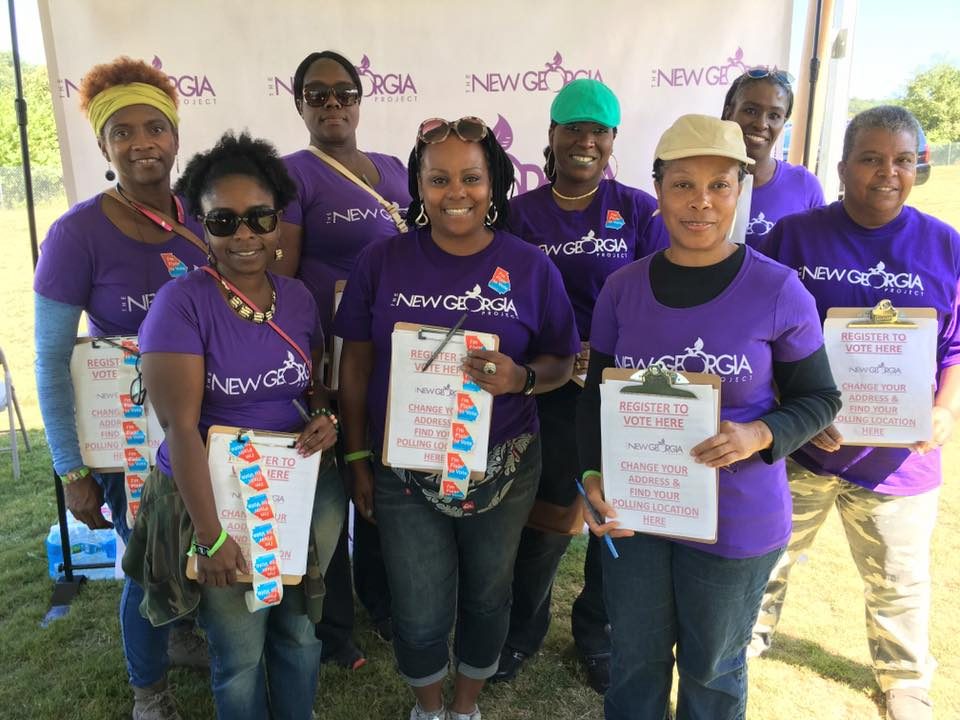
According to the NGP, approximately 18,000 voters were added to the rolls between three and nine months after the election. Of the remaining applications, 7,000 were canceled, 5,000 were accidental duplicates, and 10,000 were denied for having slightly mismatched information that didn’t pass Kemp’s “exact match” registration policy. According to Abrams, these issues were unavoidable, as state laws required the group to turn in applications regardless of whether they contained errors or were missing information.
Democratic U.S. Rep. John Lewis spoke out against Kemp, stating that he was “making it difficult for Georgians to participate in the political process.”
Meanwhile, Kemp denied the forms even existed.
Meanwhile, Kemp denied the forms even existed. The claim that there are over 40,000 unprocessed voter registration applications is absolutely false, he declared at a press conference in October 2014. “The counties have processed all of the voter registration applications they received for the general election.”
This was flaty untrue, as Kemp’s spokesperson Candice Broce later acknowledged that these applications were not processed—but only after she blamed the NGP, whose error rates were lower than most other registration drives nationwide, stating that, “If these problems continue, it is because the New Georgia Project remains uniquely sloppy in their registration efforts.”
The investigation found only 53 potential forgeries among the 85,000 submitted applications—roughly 0.001 percent of the total submissions. The potential forgeries were linked to independent contractors hired by external organizations working with the voter registration effort and the NGP was cleared of any wrongdoing. During a September 2014 press conference, Kemp’s lead investigator said, “We have not detected from anything that [NGP leaders] have said or done that it is a goal of the New Georgia Project to go out and commit voter registration fraud.”
As of September 2019, there is still a “fact check” FAQ from 2014 on the Georgia Secretary of State’s official website in which Kemp denies targeting the NGP and impeding voter registration.
2018: The Democratic Party of Georgia
The 2014 NGP showdown set a clear tone for the 2018 gubernatorial race between Kemp and Abrams. Kemp refused to step down from his position as Secretary of State during the campaign, despite being urged to do so. President Jimmy Carter wrote in a letter to Kemp, “Popular confidence is threatened not only by the undeniable racial discrimination of the past and the serious questions that the federal courts have raised about the security of Georgia\’s voting machines, but also because you are now overseeing the election in which you are a candidate.”
During their only official campaign debate, Abrams summed up the ultimate goal behind Kemp’s tactics: “Voter suppression isn’t only about blocking the vote, it’s also about creating an atmosphere of fear.” Kemp further obstructed the discussion by pulling out of their second and final planned debate that was scheduled for Sun., Nov. 4, 2018 (two days before Election Day), at the last minute to attend a Donald Trump campaign rally in Macon. Trump tweeted his support for Kemp several times, calling Abrams “unqualified” and claiming that she “would destroy a great state.”
The press announced the debate was cancelled on Oct. 31, 2018—four days before the scheduled debate and 20 days after Kemp was sued by the AAAJ and other civil rights organizations over his exact match policies implemented in Georgia’s voter registration systems. Fortunately for Kemp, the timing of the Trump rally relieved him of the burden of publicly defending this investigation in a debate against Abrams. By this time, Abrams and Kemp were practically tied in the polls.
Meanwhile, independent cybersecurity researcher Richard Wright discovered that it was possible to change voter information within the state’s online registration system and notified election security attorney David Cross. While Cross contacted the FBI and Kemp’s office with this information, Wright also contacted the Democratic Party of Georgia’s voter protection team. Director Sara Tindall Ghazal alerted two Georgia Tech cybersecurity experts with an email—one of whom was serving on a commission created by Kemp. “If this report is accurate,” she wrote, “it is a massive vulnerability.”
Kemp and his office took the outline of this story and framed it as the Democratic Party attempting to hack the voter database, ignoring the fact that no actual hack occurred.
Kemp and his office took the outline of this story and framed it as the Democratic Party attempting to hack the voter database, ignoring the fact that no actual hack occurred and that the Democratic Party had nothing to do with finding or exposing the vulnerability—except to alert officials of the vulnerability in the interest of protecting Georgia’s voting system. On Sun., Nov. 4, 2018—two days after Judge Ross ruled against Kemp in the exact match lawsuit and two days before the election—Kemp announced an investigation into the Democratic Party of Georgia, creating an atmosphere of fear and panic in Abrams’ office and campaign.
Without citing any evidence, Press Secretary Candice Broce declared in a post on the official Georgia Secretary of State website that Kemp’s office had contacted federal authorities and was investigating the Democratic Party for “possible cybercrimes.” As of September 2019, no further details have been provided while the post remains on the official Secretary of State website. Turns out there was no investigation after all.
Kemp’s investigations into political opponents and voter registration organizations are an abuse of power and clearly direct efforts to suppress minority voter turnout, all under the guise of protecting Georgia from voter fraud. As we’ve seen, none of these cases have provided any evidence of voter fraud leading to any convictions, proving it to not be a substantial issue; certainly not enough to warrant the amount of time and taxpayer dollars spent in launching these exasperating investigations into organizations specifically built to help mobilize people of color.
By using his executive powers to suppress voter registration efforts over the last 10 years, Kemp is essentially practicing legal terrorism, exploiting the law to intimidate and discourage citizens from accessing their constitutional right to vote. Even worse, conservative Georgia lawmakers support Kemp’s tactics and continue to work with him to pass legislation that targets and disenfranchises minority voters. Despite multiple lawsuits against him for voter suppression and widespread condemnation of his election policies, these manipulative tactics ultimately helped Kemp secure the 2018 governor’s election—a hollow, narrow victory that seems to have only been won by force and outright cheating.



